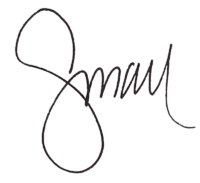Course correction can be a tricky thing. I am the queen of overcorrection gone awry.
Overcorrection is generally my jam. When I can’t find a clothing item in my closet, I throw out too many things. Inevitably there is something I end up needing to repurchase (I’m looking at you, khaki pants). I cancel all my streaming services to save money, then buy 5 books and a ball of yarn to keep busy and can’t figure out why the balance is still negative.
Sometimes adjustments that don’t work are not overcorrection as much as just paying attention to the wrong thing. I focus on not crashing into trees while mountain biking or people while surfing, then crash into those trees or people. Today I want to talk about how to navigate course correction when you know a habit is no longer serving you.
Course Correction from Coach’s Playbook
As an athlete I understand that sometimes to teach a skill you have to overcorrect in order to fall in the middle. When I swam on a masters team I struggled with a part of my stroke where I was crossing my hand too far in one direction. In order to correct this, my coach had me swim with my arms REALLY wide. It felt awkward, unnatural and slowed me down. This did not seem like it was making me swim faster (i.e., not productive) and it was extra tiring mentally and physically (i.e., not sustainable). But this is the neat thing about the body – it can adapt to almost everything. It wants to be good to us so it adjusts to the conditions we give it – for better or for worse. After doing the wide arm swim drills consistently for a few weeks, my stroke was corrected (that part of my stroke at least). An amazing thing happened – with a more efficient stroke I was able to go faster with less energy.
Sometimes we just need to get out of our own way and try something radical. I watched the Robin Roberts interview with Michelle Obama a few months ago and something Michelle said struck me. She was talking about always trying to achieve and be her best. She said, “Sometimes my mental health gets in the way, it’s not sustainable.” Perhaps Michelle listens to the Sustainable Productivity Podcast?!
Course Correction from a First Lady
This was the interview where she talked about learning to knit during the pandemic. She wanted her book Becoming to be out in the world, but COVID cancelled her book tour. She was like we all were – concerned about the world, our kids education and mental health, and where we would get toilet paper. So she had to take the opposite approach and find a way to check out of her monkey mind and found knitting.
This is like another Michelle Obama gem: They go low, we go high.
I’m trying, girl. That is a tall order.
But you see where I am going with this related to course correction. Instead of trying harder, longer, faster, more in the same direction – let’s opposite to get what you want / need.
Slow down to go fast. If you are training, make sure you get your rest. Rest and sleep is when your body rebuilds itself. Be sure to work on flexibility, not just strength training. A flexible muscle is a strong muscle.
Go quiet to find your voice. When I am struggling with something I am writing, it helps to stop and take a break. I always try to work ahead because nothing stops creativity for me than a deadline. There is a corollary to this with relationships too. In order to help my spouse understand what I am saying, I need to shut up and listen to what HE hears me say. Communication is weird!
Go small to go big. This is another one from Michelle Obama. To do big things, focus on small details. You cannot change world hunger if you don’t learn what you need to learn today. To run a marathon, you need to do a 3 mile recovery run today. To manage your anger and repair your relationships, you need to spend an hour with a therapist today.
Friends, sometimes we just keep going down the same worn path and wonder why you are not getting the result you want. I encourage you to take course correction in another direction. Maybe the opposite, maybe just a swerve. It might be counterintuitive or it might be what the universe keeps tapping you on the should to know. Beware of that overcorrection, but if you end up there we can course correct together from there.
Sustainable You Reflections
- What habit have you been thinking about adding, removing or changing?
- What is one small course correction you could take today or tomorrow?
Until next time remember to create productive results in a way that you can sustain and that sustain YOU.

Leave A Comment